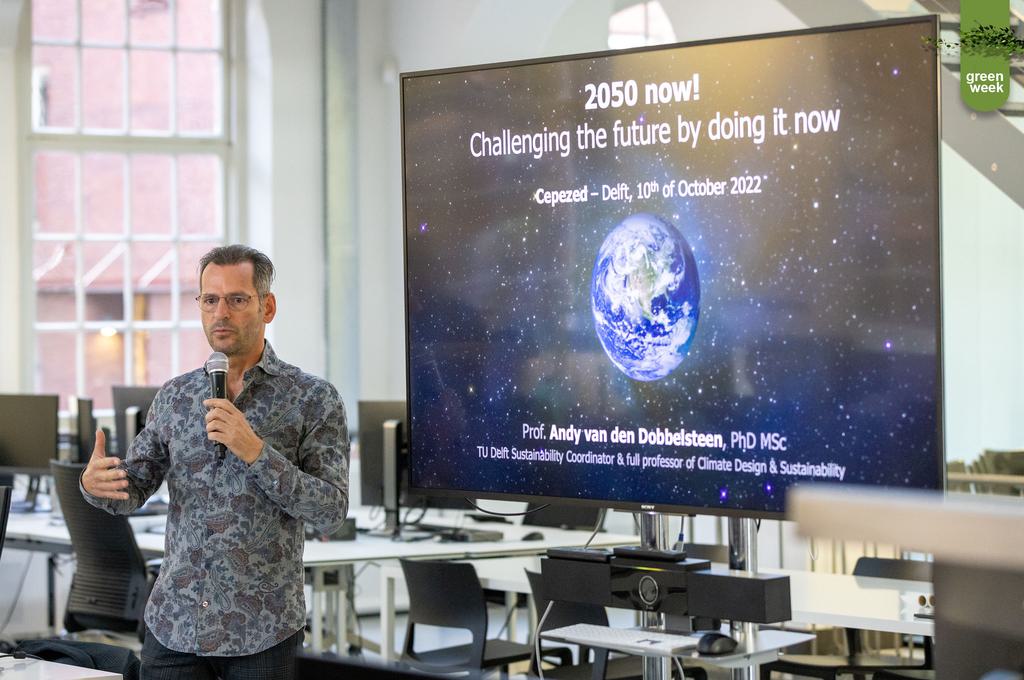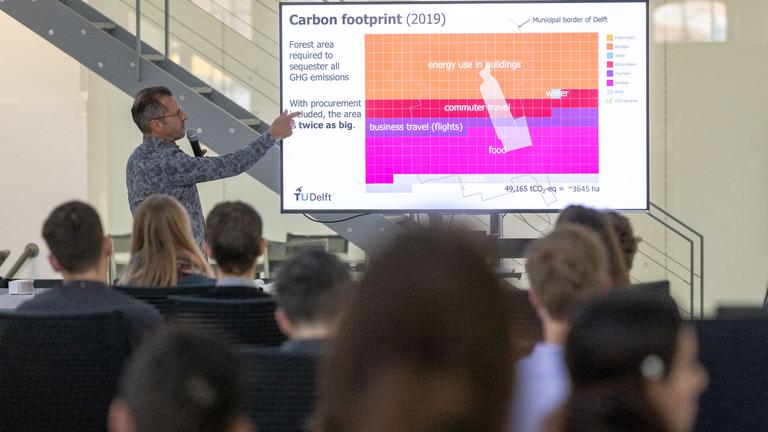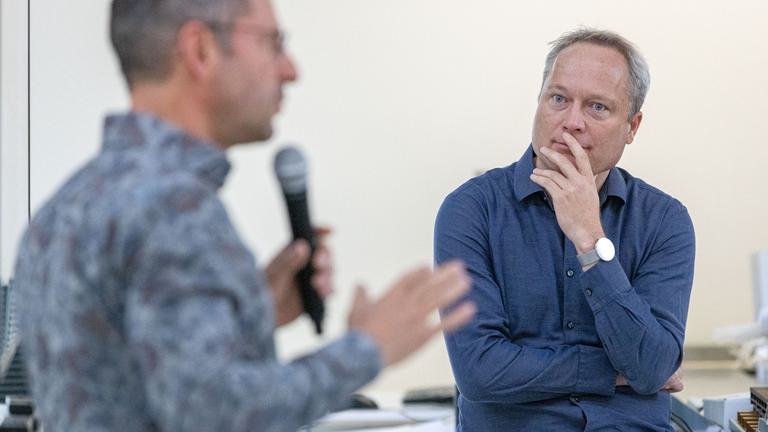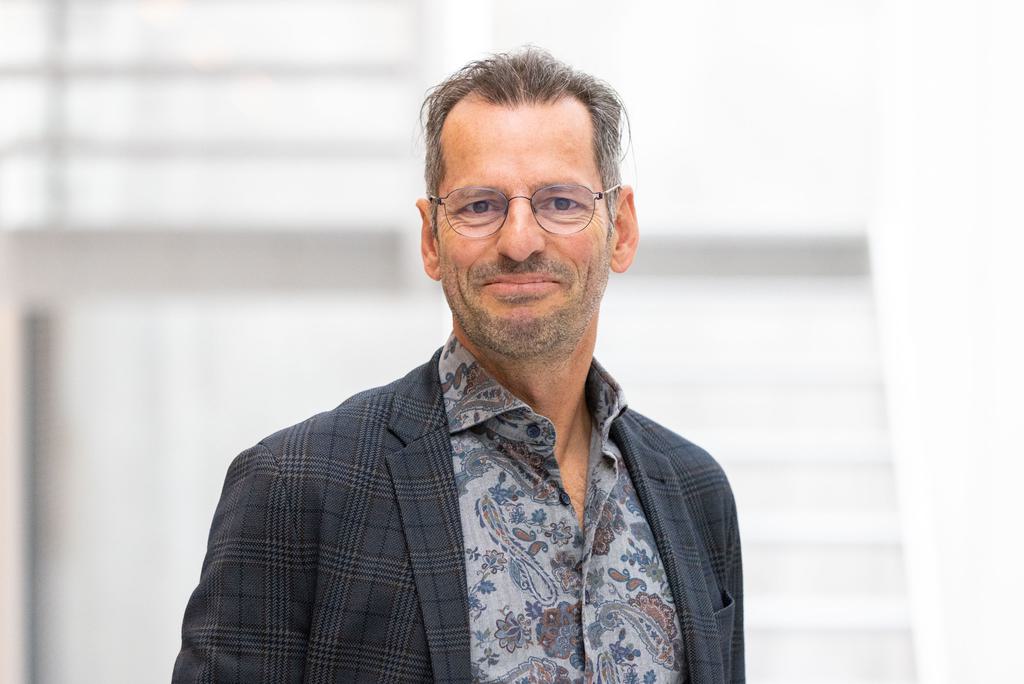Andy van den Dobbelsteen kicked off cepezeds Green Week this morning with the first lecture. He mentioned the urgency of the sustainability challenge and outlined the exemplary sustainability measures TU Delft is taking.
We need to make choices as if the expected climate conditions of 2050 are already in place now, said Andy van den Dobbelsteen. 'The year 2050 as a target date for change is far too non-committal. We are already seeing the effects of climate change in extreme weather, fires and floods.' The vagueness of the term ‘sustainability’ also does not, in his view, prompt immediate action. As far as he is concerned, the best definition of sustainability links to future generations. It is about them, not us.
sustainable design
Surprisingly, Andy mentions seemingly obvious aspects with which an architectural design can contribute to sustainability: modular construction, de- and remountable construction, recycling and the use of bio-based materials, the application of green roofs and solar panels on facades – not on roofs, with the sun’s angle in the Netherlands. Above all, he wants to stress the effect of these choices. And that more and more is possible from a creative point of view. According to TU Delft research, we can even grow food in buildings and on their roofs and facades, thus creating synergy in energy, water and nutrients.
floods
We need to take the soil we build on much more into account, according to Andy. 'Even in Zuidplaspolder, the deepest polder in the Netherlands, we build in the old-fashioned way. Here, a flood of 1.50 metres is predicted once every hundred years - adding waves, you're down to 1.60. It would be better to build split-level (with an entrance half-high), lift the houses all the way up, make them water-resistant, or put them on mounds'. For other situations, floating buildings could be an option.
text continues below the photos
Andy van den Dobbelsteen: start thinking beyond the building



beyond the building
It would also hugely lessen the CO2 emissions if architects started thinking beyond the building. By this, Andy means designing buildings that are part of an energy network - 'which can be totally interesting in the city'. For example, houses above a supermarket or metro can use the residual heat from that supermarket and metro. Water in canals can be used for both heating and cooling buildings. And there is the option of geothermal heating and cooling.
total cost of ownership
But the most important thing when it comes to processes is the necessary change in the current economic system. At present, the cheapest things are the most polluting. And producers pull their hands off their merchandise after selling it. For TU Delft, Andy tries to assume circular contracts from the smallest to the largest items, and in terms of financial consideration counts the 'total cost of ownership', which includes a CO2 price of one hundred and fifty euros per tonne.
the ecoman
'Everyone has ambitions, but no one knows where to start,' says Andy. His solution: start with accounting, so you get a picture of the existing situation and an understanding of the consequences of measures. For example, he had calculations made of how big the forest should be that could offset TU Delft's CO2 emissions. That turned out to be three times the area of Delft: impossibly large. To reduce the university's emissions, among other things, it has been agreed that employees (for their work) will not travel by plane if a train journey takes less than eight hours. Together with many other actions, including the reuse of buildings instead demolishing and reconstructing, emissions could be reduced by as much as two thirds.
Sustainability often seems to be a matter for a company, government or institution, but they consist of individuals, Andy stresses. He outlines what he encounters in his own efforts to be an 'ecoman' and calls on us all to become an 'eco-person' too.
Andy van den Dobbelsteen is professor of Climate Design & Sustainability and Sustainability Coordinator at TU Delft and principal researcher at the Amsterdam Institute for Advanced Metropolitan Solutions.

more about the cepezed Green Week:
• green week at cepezed
• Menno Rubbens: towards an intrinsically circular building sector
• Joost Jacobi: the ins and outs van ‘water circular design’
• Chantal van Schaik: the carbon budget is not taken seriously
• MOR studio: architecture should leave something positive rather than use something up
→ Mail bd@cepezed.nl or call our business development team on +31 (0)15 2150000